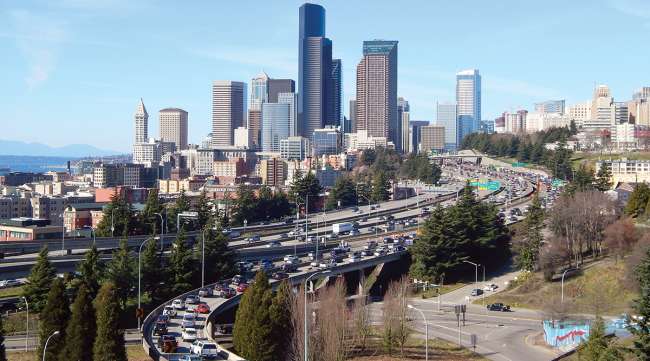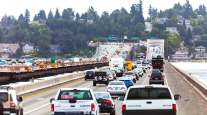Staff Reporter
Washington Supreme Court Rules Current Piece-Rate Pay Practices Are OK

[Stay on top of transportation news: Get TTNews in your inbox.]
The Supreme Court of Washington filed a decision upholding minimum-wage compensation practices employers use to pay commercial truck drivers.
The decision, issued Sept. 5, ruled on a class action lawsuit brought by Valerie Sampson and David Raymond, two Knight Transportation drivers, against Knight Transportation, Knight Refrigerated and Knight Port Services.
The U.S. District Court for the Western District of Washington determined, under state law, that non-agricultural employers are not required to pay their piece-rate employees per hour for time spent performing activities outside of piece-rate work. In trucking, piece-rate work generally means payment by the mile.
Employers comply with Washington’s Minimum Wage Act by paying workers a minimum hourly wage that guarantees that the total wages for the week do not fall below the statutory minimum wage for each hour worked.
Sampson alleged that Knight violated wage and hour laws, claiming that drivers spend time completing tasks for which they are not paid. The plaintiff said that piece-rate drivers must receive separate hourly compensation for all time spent “on-duty not-driving,” which includes tasks such as loading, fueling and conducting pre-trip inspections.

The main issue in the case was whether workweek averaging, which is authorized in the Washington Administrative Code, is consistent with the Minimum Wage Act’s requirement that workers receive compensation for each hour worked. Workweek averaging is the practice of dividing an employee’s total wages earned in a week by the total hours worked in order to determine if Minimum Wage Act compliance has been met.
Sampson referred to a previous decision, Carranza v. Dovex Fruit Co., in which the court determined it is reasonable for the Department of Labor and Industries to exempt agricultural workers who are paid on a piece-rate basis from workweek averaging.
The court decision points out the distinct differences between piecework compensation in the agricultural and trucking industries. Unlike agricultural laborers, such as fruit-pickers, truckers are not closely supervised throughout the day. They are frequently away from their employers’ offices, and they are not paid a per-mile rate in the hopes that they will drive faster or cover more miles in an hour.
“For the past 45 years, the regulation has reflected the department’s reasonable determination that workweek averaging is a valid measure of compliance with the [Minimum Wage Act] for non-agricultural workers,” the court document states. “Meanwhile, [Washington Administrative Code regulations] reflect the department’s reasonable determination to exempt agricultural workers from workweek averaging in light of their particular circumstances. Nothing has changed that would bring the reasonableness of either determination into question.”

Pianka
American Trucking Associations and Washington Trucking Associations filed an amicus brief April 1 that championed the piece-rate pay system, calling it a “win-win.”
ATA Deputy General Counsel Rich Pianka said there was some concern that the court would decide to make Washington’s laws align more with California’s. In California, the law requires motor carriers that pay their drivers on a piece-rate system to also pay separately, on an hourly basis, for non-driving time.
The brief notes that California’s decision did not result in motor carriers paying their drivers more for the same work. Instead, carriers developed “hybrid” pay systems that ensure drivers are compensated on an hourly basis for non-driving time, while at the same time resulting in the same total compensation the driver would have received under a piece-rate system that permitted averaging.
“It’s a good decision for the industry. It’s a good decision for everybody,” Pianka told Transport Topics. “When California’s law shook out this way, it didn’t mean that drivers were getting paid more. It just meant they had to be paid differently. It didn’t benefit anybody but the trial lawyers who were suing over these concocted violations.”




